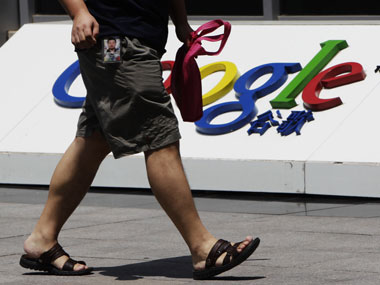Google India, which along with 20 websites is facing criminal case for allegedly hosting objectionable materials, today told the Delhi High Court that blocking them was not an option as demorcratic India does not a “totalitarian” regime like China.
“The issue relates to a constitutional issue of freedom of speech and expression and suppressing it was not possible as the right to freedom of speech in democratic India separates us from a totalitarian regime like China,” advocate NK Kaul, appearing for Google India, told Justice Suresh Kait.
In what can act as a precedent for international Internet companies operating in India, Hariharan, counsel for Vinay Rai, made a strong case for a connection between Google India and Google Inc.
The lawyer said that Google India cannot absolve itself from the responsibility of hosting objectionable content by putting the blame on Google Inc.
[caption id=“attachment_184051” align=“alignleft” width=“380” caption=“Reuters”]  [/caption]
Appearing for Google India on Thursday, Mukul Rohatgi had said that Google India was only into marketing and promotions. The company, responsible for content, Rohatgi said, was Google Inc.
Countering the argument, Hariharan said “Google India has a pervasive control over Google India. Every click on Google, here in India, generates revenue for Google Inc.”
There is a nexus between the company in India and abroad," he added.
Google is one of the 21 companies entangled in a legal case for allegedly hosting objectionable content.
While hearing the matter on Thursday, justice Kait had said that if immediate steps were not taken, the websites would be blocked the way it happened in China.
On Friday, the Centre gave its sanction to a lower court in Delhi to prosecute the executives of 21 companies, including Google and Facebook, for posting objectionable content online.
“Government of India after being satisfied that such contents are violative of the provisions of the information technology (intermediaries and guidelines) rules 2001 and after due application of judicious minds find it appropriate to grant sanction under 196 of CrPC to proceed against the accused persons in the aforesaid complaint in national harmony, integration and national interest,” said the document submitted by Seema Sharma, Government of India’s counsel in the case ‘Vinay Rai versus Facebook’.
The government of India also found that action can be taken against the websites under section 153 A, 153 B and 198A as the content therein, in its view, can instigate enmity between different groups, is prejudicial, and threatens national integrity.
The court also asked the Ministry of External Affairs to summon the executives of 10 companies head-quartered abroad.
In December last year, Delhi based journalist Vinay Rai filed a criminal suit in a lower court against 21 companies on the ground that the websites run by these companies host blasphemous and derogatory material which could even leads to riots.
That was when the companies moved High Court asking for a stay.


)
)
)
)
)
)
)
)
)



